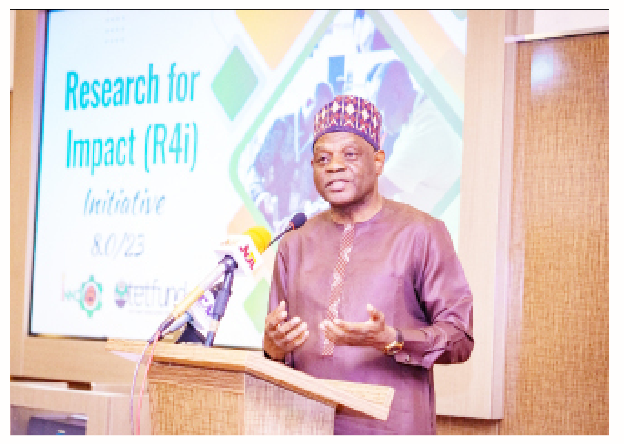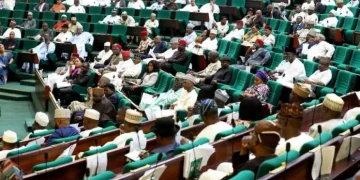The Tertiary Education Trust Fund (TETFund) commitment to excellence is manifesting through the transformative power of its book development initiative, paving the way for higher educational standards and enriched learning experiences.
The project seeks to bridge the gap by encouraging the creation and publication of quality textbooks.
Through this endeavor, TETFund aims to promote academic excellence and support the intellectual growth of students and educators alike.
The executive secretary of TETFunds, Arch. Sonny Echono, at the recent inauguration of the reconstituted TETFund National Research Fund Screening & Monitoring Committee (NRFS&MC), the Technical Advisory Group (TAG)
said both teams were constituted to drive the process of implementing the National Research Fund and facilitate effective implementation of the Higher Education Book Development Fund, respectively.
He said, “A few years ago, the scarcity of tertiary level texts in Nigeria’s Higher Educational Institutions reached a crisis proportion.
“The need to tackle this crisis head-on resulted in the establishment of TETFund Higher Education Book Development Project. The paucity of indigenously authored and produced tertiary level textbooks and related academic publications in the nation’s tertiary education institutions is particularly a threat to academic excellence and National pride.
“To ensure successful implementation of the Higher Education Book Development Project, the Board of Trustees set up the Technical Advisory Group (TAG) and a blueprint titled “Higher Education Book Development Fund and the Mandate of ETF” was developed and adopted.
“So far Eighty (80) manuscripts have passed through rigorous review processes and successfully published as textbooks, sixty (60) of these were published between 2022 and 2023.”
According to him, an additional set of twenty (20) textbooks are ready for presentation to the public while additionally, Forty-Nine (49) manuscripts are at the final stages of review.
As part of the Intervention, Echono said Seven (7) Academic Publishing Centres (APCs) have been established in the six geo-political zones and Federal Capital Territory, Abuja. The APCs were equipped with modern facilities for effective operations.
“It is our firm belief that the NRF and TAG will contribute immensely to improving the standing of our Public Higher Educational Institutions and the realization of the goals off such Institutions.
“We are confident that given the high quality and range of expertise and experience of members of the Two Committees, the National Research Fund and the Higher Book Development Fund will record remarkable success and achieve even greater heights.
“The Report of the Committee on upgrade of equipment in laboratories and workshops at our beneficiary institutions will provide the framework and milestones for practically hands-on application of knowledge and accelerated skills development in our country,” he added.
He further noted that the TETFund National Research Fund intervention line was introduced in 2009 as a Special Intervention, aimed at promoting the conduct of applied research and innovation in the nation’s public tertiary educational institutions.
Following extensive consultations with experts and various stakeholders, the blueprint for roll-out was produced which mirrors Nigeria’s National Research Agenda, encapsulating the priority areas of research, for the accelerated development of our dear Country.
In order to actualise the objectives of the NRF, Echono said the Board of Trustees set up the NRF Screening and Monitoring Committee (NRFS&MC) and charged it with the responsibility for implementing and administering the intervention.
“In 2020, the Committee carried out a review of the three thematic areas of the NRF research spectrum and incorporated emerging issues of National developmental challenges requiring innovative solutions. Since inception, a total of 912 Research Grants have been awarded at a total cost of ₦24,021,679,195.88.
“As we all know, research output has been the main factor or criterion for ranking world-class universities. Research output is a quantitative and measurable means by which academics contribute to new knowledge and provides a gateway to solving specific technological, economic and social prerogatives.
“Research must be meaningful, impactful, and must be seen as a business that generates useful products and/ or services to society. If Research Projects are unable to solve societal challenges despite all the funding, then such research projects must be seen as ineffective for the achievement of the NRF Intervention goals.
LEADERSHIP report that the task before the Chairman and Members of the NRFS&M Committee is essentially to improve on the performance of the NRF implementation and ensure identification of appropriate proposals through the various mechanisms of the Committee for funding. I expect this to be a major priority of this Committee.
Also speaking, the Minister of Education, Prof. Tahir Mammam thanked the Chairmen and members of the two Committees for their patriotism in accepting to serve on this national assignments.
He said they were carefully selected to serve on the reconstituted Committees based on their individual capacities and the ability to work collectively as a team to deliver on these tasks.
The Minister said that innovative research and its commercialisation remains the driver of economic growth and prosperity in the contemporary world.
“All forms of economic development in the modern era depend on increased productivity arising from purposeful and problem-solving research.
“However, this is not possible without adequate and sustainable funding for research and development, and it is only by promoting applied research that the academia can feed the industry to generate employment and facilitate economic growth. R&D is indeed a key pre-requisite for accelerated national development and global competitiveness.
“As you may be aware, the National Research Fund (NRF) was established in 2011 to help resuscitate research activities in the Nation’s public tertiary institutions and the NRF Committee is supporting the Fund to ensure effective administration of the grants.
“I am pleased to acknowledge that the NRF intervention has been a lifeline for reinvigoration of research activities in our tertiary institutions. The Fund has also been making concerted efforts to identify more innovative ways of deploying resources to fund research programmes and projects with a view to deepen the institutionalization of R&D to tackle national challenges,” he added.
He further said from the inception of NRF intervention in 2011, the Fund has awarded a total of Nine Hundred and Twelve (912) Research Grants to researchers from public tertiary institutions at the cost of over ₦24Billion.
“Let me use this opportunity to specially thank President Bola Ahmed Tinubu, GCFR for graciously approving the sum of ₦5Billion for NRF and ₦8Billion for provision of Central Multipurpose Laboratories in some Universities across the country among numerous other groundbreaking projects under the 2024 intervention budget.
“This is indeed a strong demonstration of His Excellency’s commitment to the promotion of research activities in our tertiary institutions to support national development.
“Besides, TETFund has continued to provide sponsorship for Institution-Based Research (IBR) to facilitate the revival of quality research among the lecturers in Tertiary Institutions and assist them to build capacity for higher research. To strengthen this intervention and deepen its impact, I have approved an upward review of the funding ceiling per IBR project from ₦2Million to ₦5Million for Science-Based Research and ₦4Million for Humanities and Social Science Research in line with current realities,” he added.
He also expressed worry that the quality of most academic publications in the country leaves much to be desired, saying that overtime, Nigeria’s tertiary education institutions became dependent on books published outside the country with the attendant consequences of the pressure on the demand for foreign exchange.
“It is therefore expected that nurturing the culture of quality authorship and the production of indigenous books will not only ensure the availability of relevant books in the diverse subject areas that take cognizance of our local environment and sensitivities, it will also safeguard national pride and reduce the demand for foreign textbooks.”
According to him, it was in response to the challenge that TETFund initiated the Higher Education Book Development Project for intervention in the three key areas of publication of academic books and the conversion of high-quality theses into books; support for Professional Association Journals; and establishment as well as sustainability of Academic Publishing Centres (APCs).
The TAG, he said is supporting the Fund for effective implementation of the intervention.
The 55-member reconstituted TETFund National Research Fund Screening and Monitoring Committee has Prof. Hayward B. Mafuyai as the Chairman, while the 48-member reconstituted Technical Advisory Group has Prof. Albert A. Abegunde as Chairman.
The membership of the two Committees were drawn from Nigerian Tertiary Education Institutions (Universities, Polytechnics, Colleges of Education), representatives of the academic staff unions of these institutions, representatives of relevant regulatory agencies (National Universities Commission – NUC, the National Board for Technical Education – NBTE, and the National Commission for Colleges of Education – NCCE).
The Terms of Reference for the NRF Committee are to:
Pre-qualify applications for research grants from academics in Beneficiary Institutions to ensure that they are in compliance with the approved templates for accessing the TETFund NRF Grant;
Categorise pre-qualified Research Proposals into streams and disciplines to aid the appointment of Assessors/Reviewers;
Recommend pre-qualified and categorized proposals;
Serve as members of the NRF Proposal Defence Panel;
Monitor and report progress of ongoing research work; and
Carry out any other responsibilities as may be assigned by the Fund.
Meanwhile, the TAG is charged with the following responsibilities:
Screen proposals on Manuscripts for Development into Academic Textbooks and advising TETFund on fundable Manuscripts;
Screen and advise TETFund on submission from Professional Associations to support production of journals;
Advise the Fund on how to enhance and improve the production of quality academic books, journals and other academic learning materials, amongst others.











